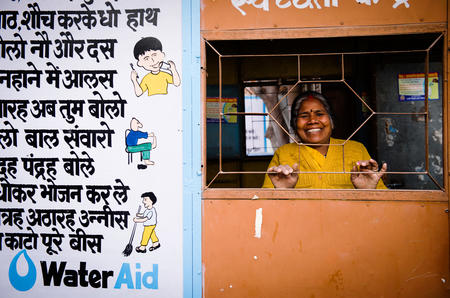Toilets save lives

Toilets really are incredible. And the best thing about them is they do more than you could ever imagine: they help people have better health, dignity, safety and so much more.
It is easy to take a toilet for granted. But for 1.5 billion people in the world – almost one in five – such a normal part of daily life is out of reach.
A lack of decent toilets and clean water causes diarrhoeal diseases that claim the lives of almost 750 children every day – one nearly every two minutes. The health impacts of poor sanitation trap people in poverty, making it difficult to get an education or to work to support their families.
That's why we don't just support local partners in installing toilets. We also create lasting change by training people in the communities to build, fix and maintain sanitation services, so that entire communities can unlock their potential and lead healthy, dignified lives.
Meet some of the inspiring people transforming their communities by designing, building and cleaning the toilets that help save lives.
Ernest, toilet builder, Burkina Faso
Ernest is a member of a team of toilet builders in Zongo, Burkina Faso.
With limited access to decent toilets in the town, people often have no choice but to go outside – increasing the risk of spreading deadly diseases.
But Ernest’s hard work and dedication have convinced people in the community of the importance of decent toilets – and even encouraged them to learn how to build their own.
“I love my job,” says Ernest. “I think the new toilets have made a huge improvement to the community – there will be far fewer diseases.”
Chanda, community toilet caretaker, India
“I work to protect and help the dignity of my community,” says Chanda, a toilet caretaker in Delhi, India.
Chanda’s district used to have no access to decent toilets. But after working with our local partner, FORCE, the community gained access to a new toilet block. This greatly reduced the risk of sexual harassment for women and girls in need of a private place to relieve themselves.
Chanda now works to keep the new facilities spick and span, and to help ensure her neighbours are safe and healthy.
“Keeping the toilets clean is my favourite thing about my job. I like it because there are no more diseases now – the children and community are happy.”
Amin, mobile toilet keeper, Bangladesh
"Previously there was no toilet, so people had to go to bus or train stations or to hospitals, and these were not welcoming to everyone. So now the mobile toilet is at a bus stop, it's a very central place. The bus drivers, rickshaw pullers, all can use it."
Born with a severely disabled leg and hand into a poor family, Amin was not educated as a child and his disability means he is unable to work in traditional labourer jobs. WaterAid's local partner approached him to work as a toilet operator and attendant on a mobile toilet scheme.
Toilet operators pay a monthly fee towards ownership and a continuing amount to the local partner for maintenance costs. Amin has now paid off the cost of his two mobile toilets - one for men, one for women - and is proud to be able to provide for his family.
“I used to beg before, for a living. With this operation, I am able to earn a better living.”






